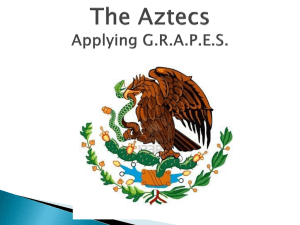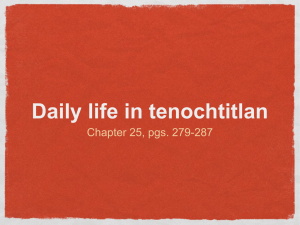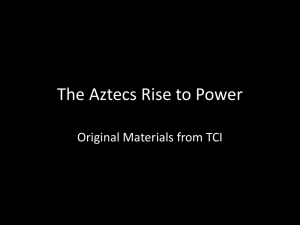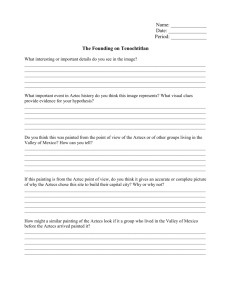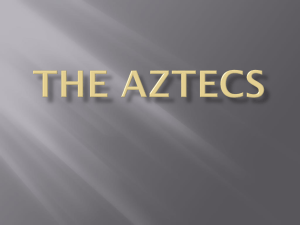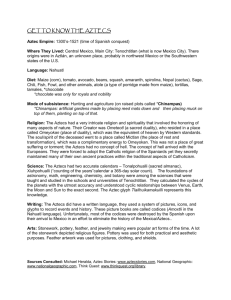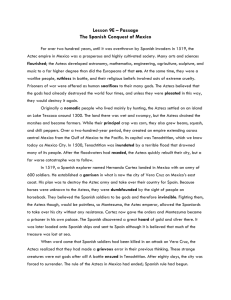México
advertisement
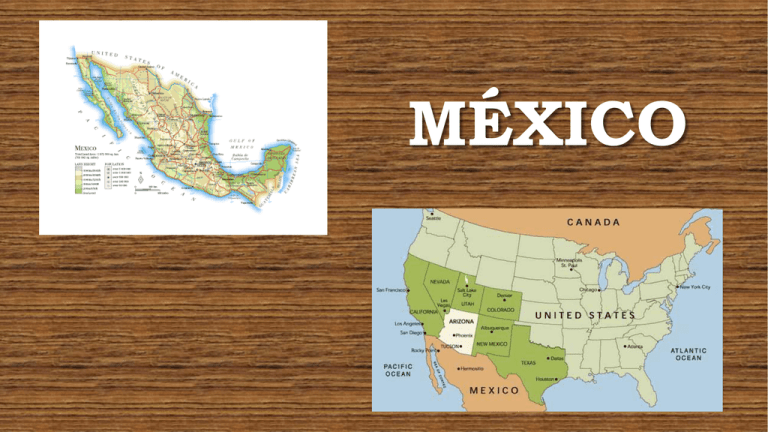
MÉXICO INTRODUCTION • Capital: Mexico City • Population: 115 million • Official language: Spanish • Main languages spoken: Spanish, Nahuatl, Mayan, Zapotec, Mixtec, Otomi, Totonac, Tzotzil, Tzeltal • Currency: Mexican peso • Mexico separates the US from the rest of Latin America. • Mexico was colonized by the Spanish for its silver mines, but Mexico achieved independence in 1836. • In the "Epic Revolution" of 1910–1920, in which 250,000 died, much of modern Mexico's structure was established. • In 1994, Mexico signed the North American Free Trade Agreement (NAFTA). • NAFTA has bonded the economies of Mexico and the US. THE MEXICAN FLAG • The Mexican flag consists of three vertical bands in green, white and red, with the Mexican coat of arms (which portrays an eagle on a prickly pear cactus with a snake in its beak and talons) in the center of the white band. • The flag represents hope (green), unity (white) and the blood of the national heroes (red). • The Mexican Coat of Arms is taken from an Aztec legend which recounts the way in which the Aztecs came to choose the site where they built their capital city of Tenochtitlan (where Mexico City stands today). The Aztecs, also known as the Mexica ("meh-shee-ka"), were a nomadic people traveling from the north of the country. Their leader was informed in a dream by the god of war, Huitzilopochtli, that they were to settle in the place where they would find an eagle on a prickly pear cactus holding a serpent. The place where they saw this sight was quite inhospitable - a swampy area in the center of three lakes, but this is where they settled and built the great city of Tenochtitlan. PEOPLE The urban/rural population split Population Age Breakdown Ethnic makeup EDUCATION • Public education, officially mandatory for the first six years, is underfunded and rural provision is poor. • The education system is a mixture of the French and US models. • There is a well-developed public university system. THE AZTECS • Mexico City was built on the site of the Aztec capital, Tenochtitlán. • The Aztec kingdom of Montezuma II was defeated in war by the Spaniard, Hernán Cortés, in 1521. • By 1546, the Spaniards had discovered large silver mines at Zacatecas. Mexico, then known as New Spain, became a key part of the Spanish colonial empire. AZTECS WHERE DID THE AZTECS LIVE? • The Aztecs lived in what is known as the Valley of Mexico in central Mexico. TENOCHTITLAN • Tenochtitlan was the capital city of the Aztec Empire. LEGEND OF TENOCHTITLAN The gods told the Aztecs to search for an eagle holding a snake in its beak perched atop a cactus. This is where they were to build their capital city. The Aztecs saw this sign on a swampy island in lake Texcoco. LEGEND OF TENOCHTITLAN HOW DID THE AZTECS BUILD A CITY IN THE CENTER OF A LAKE? • Tenochtitlan was built on an island • It was connected to the mainland by causeways leading north, south, and west of the city. • The city was interlaced with a series of canals, so that all sections of the city could be visited either on foot or by canoe. TENOCHTITLAN • Today, Tenochtitlan is Mexico City GOVERNMENT • The Aztecs created an empire through conquest • Conquered people and local rulers had to pay tribute to the Aztecs • The Aztecs had an emperor • The Aztec Emperor’s main job was to lead in war RELIGION & MYTHOLOGY • Aztecs were polytheistic • Huitzilopochtli was the main Aztec god. (weets se lo poch tlee) • The Aztecs built massive temples and pyramids dedicated to their gods RELIGION & MYTHOLOGY Pyramid of the Sun Pyramid of the Moon HUMAN SACRIFICE • Human sacrifice was a common practice of the Aztecs. • For the reconsecration of Great Pyramid of Tenochtitlan in 1487, the Aztecs reported that they sacrificed 84,400 prisoners over the course of four days. • To give the sun strength to rise each day, human sacrifices were offered. WHAT HAPPENED TO THE AZTECS? • Spanish conquistadors led by Hernan Cortes conquered Tenochtitlan and defeated the Aztecs in 1521. • http://dsc.discovery.com/tv-shows/other-shows/videos/out-of-egypt-aztec-ruins.htm
